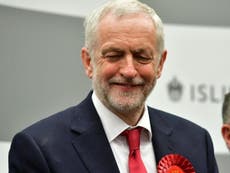Labour’s civil war should be fought over the substance of Brexit and the economy, not the form of rule changes
The election result was a remarkable, if qualified, vindication of Jeremy Corbyn’s politics: now his supporters must win the argument in the party rather than engage in factional warfare

The Labour Party’s civil war was paused in public for the duration of the general election, but hostilities, which had never really been suspended, resumed in earnest the following day. As we report today, Jeremy Corbyn’s opponents are already organising for rule changes at this October’s annual party conference in Brighton.
The activists behind the plan to double the number of representatives of Labour local councillors on the party’s National Executive Committee would no doubt say, in private, that they are merely countering attempts by Mr Corbyn’s supporters to change the rules in his favour that have been planned for some time.
The Labour leader’s supporters want to increase the number of representatives on the NEC who are elected by party members, most of whom back Mr Corbyn. They also want to allow candidates for the leadership to be nominated by local parties and trade unions as well as by MPs; they want to make it easier for local parties to deselect Labour MPs; and they want to abolish the one-year delay in making changes to the party’s constitution.
It was ever thus, especially in the “people’s party”: faction-fighting has always taken the form of arcane manoeuvring over rules and procedure. Yet these are always the form rather than the substance of the debate in the party, and it is the substance to which we should attend.
We should note, above all, that the election result was a remarkable, if qualified, vindication of Mr Corbyn’s politics. His side in the guerilla war that is being fought, line by line, through Labour’s institutions, ought to be strengthened by Labour gaining 30 seats in the election and depriving Theresa May of her majority.
Mr Corbyn was onto something, for example, when he promised to abolish tuition fees. The Independent was not persuaded that it was the best use of £11bn a year of public money, even if such large sums were as easily obtainable as John McDonnell, the shadow Chancellor, implied. But clearly the idea of a generation starting its working life in debt was deeply unpopular and any future government will want to look again at the interest rate charged on student debt at the very least.
Mr Corbyn also captured a wider mood of dissatisfaction with what he successfully labelled “austerity”. It is a mood that Philip Hammond, the Chancellor, acknowledged two weeks ago when he said people were “weary” after seven years of tight public finances, and before which the Prime Minister bowed this week when she hinted that the public sector pay cap would be reviewed in the Budget.
Yet Mr Corbyn’s opponents in the Labour Party appear to be compromised by their past on this, because of New Labour’s desire to be seen as fiscally responsible. This makes little sense, as it was Ed Balls, Mr McDonnell’s predecessor, who set out in 2010 the most persuasive and well-argued case for a fiscally expansive policy. Mr McDonnell then fought the 2017 election on the same fiscal stance as Mr Balls fought the election two years before.
Most strikingly, perhaps, Mr Corbyn secured a two-point swing against the Conservatives in last month’s election despite offering no real difference in policy on Brexit. To hold onto working-class Leave voters while attracting the support of middle-class Remainers who want to stop Brexit was a surprising achievement.
These are the questions that will decide Labour’s future: does it have a credible alternative economic policy, and can it use the mechanics of a hung parliament to shape the terms of Brexit in the national interest? The sectarian struggle in the thicket of conference resolutions and the party rule book ought to be very much secondary.


Join our commenting forum
Join thought-provoking conversations, follow other Independent readers and see their replies